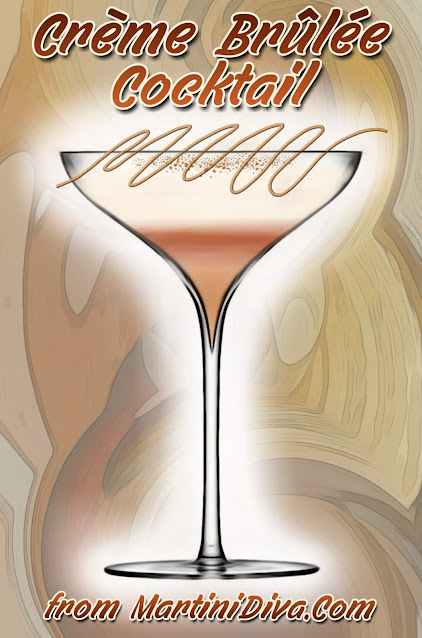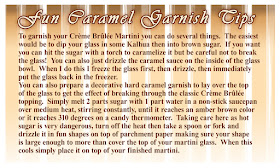This
is a truly impressive cocktail to serve to your friends, it delivers
the wonderful Crème Brûlée
flavors
but it's the beautiful caramel garnish that turns this from good to
great.
Directions for making the breakable, hard caramel garnish are below. You'll want to practice making the hard caramel garnish a few times - drizzling the caramelized sugar is a bit of a trick. I used a dessert sized spoon in the end and started outside my target area as the first drop is large. When you start moving the spoon the thread thins out - move too fast and the threads get too thin and delicate, too slow and you get big clumps. With a little practice you'll be in control but if you're impatient you can always just break off the nicer areas and drape them inside the glass.
The
Crème
Brûlée
Cocktail
1
Oz. Caramel Vodka
1
Oz. Salted Caramel Liqueur
3
Oz. Heavy Cream
GLASS: Prepared Caramelized Sugar Garnish, Pinch of Nutmeg
GLASS:
Cocktail (martini) or Coupe
TOOLS:
Cocktail Shaker
DIRECTIONS
Prepare
your caramelized sugar garnish ahead of time (instructions are just below.)
Chill
your glass in the freezer.
Fill
a cocktail shaker with ice then pour in the caramel vodka, caramel liqueur and
the heavy cream.
Shake until well chilled.
Shake until well chilled.
Strain into the chilled glass.
Dust with nutmeg then place the hard caramel garnish atop the glass for the guest or customer to break into their cocktail.
Dust with nutmeg then place the hard caramel garnish atop the glass for the guest or customer to break into their cocktail.
Here's
the instructions for making the Hard Caramel Garnish on a convenient
recipe card:
VOICEOVER VIDEO WITH INGREDIENTS AND INSTRUCTIONS:
A
little history of Crème Brûlée
The origins of custards can be traced back to the ancient Romans who were the first to use eggs as binding agents and employed the techniques in creating patinae, crustades and omelettes. The dessert type custards we are familiar with today date back to the Middle Ages where they were most often eaten like a pudding or employed as fillings in pastries or binders in tarts - the word custard is derived from crustade, a tart with a crust.
There are many claims to the invention of Crème Brûlée. Trinity College in Cambridge, England claims they invented the dessert in the 1600's where they called it a Cambridge Burnt Cream or Trinity Cream, they even have a special branding iron they use to brand the caramelized topping. Spain lays claim to a very similar dessert called a Crema Catalana, also from the 1800s, but it was the French in the 19th century brought what they called "burnt cream", literally translated as Crème Brûlée, into the world of modern cuisine.
The earliest known print reference to it is in a cookbook by François Massialot's in 1691 but a 1731 edition of Massialot's changed the name of the same recipe from "crème brûlée" to "crème anglaise".
Crème Brûlée usually is traditionally served in individual ramekins then topped with prepared discs of caramel or sprinkled with sugar which is then caramelized under a broiler/salamander, a butane torch or by flambéing a hard liquor on it.
Updated 7-2021
The origins of custards can be traced back to the ancient Romans who were the first to use eggs as binding agents and employed the techniques in creating patinae, crustades and omelettes. The dessert type custards we are familiar with today date back to the Middle Ages where they were most often eaten like a pudding or employed as fillings in pastries or binders in tarts - the word custard is derived from crustade, a tart with a crust.
There are many claims to the invention of Crème Brûlée. Trinity College in Cambridge, England claims they invented the dessert in the 1600's where they called it a Cambridge Burnt Cream or Trinity Cream, they even have a special branding iron they use to brand the caramelized topping. Spain lays claim to a very similar dessert called a Crema Catalana, also from the 1800s, but it was the French in the 19th century brought what they called "burnt cream", literally translated as Crème Brûlée, into the world of modern cuisine.
The earliest known print reference to it is in a cookbook by François Massialot's in 1691 but a 1731 edition of Massialot's changed the name of the same recipe from "crème brûlée" to "crème anglaise".
Crème Brûlée usually is traditionally served in individual ramekins then topped with prepared discs of caramel or sprinkled with sugar which is then caramelized under a broiler/salamander, a butane torch or by flambéing a hard liquor on it.
National Crème Brûlée Day is every July 27th.
Updated 7-2021



